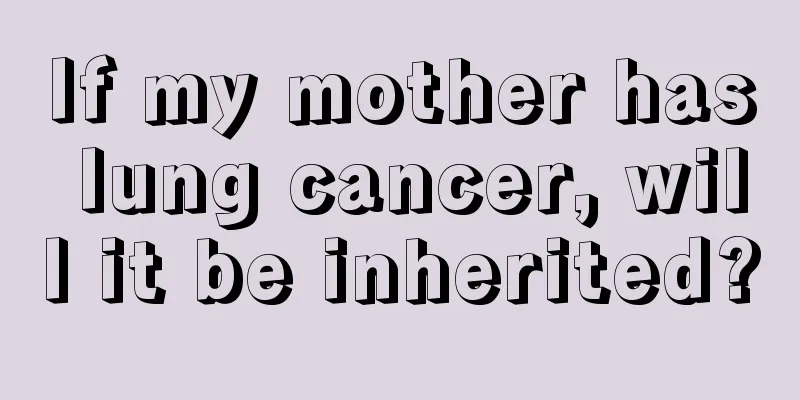How should lung cancer patients be cared for after radiotherapy? These 5 nursing points for lung cancer radiotherapy should be done well

|
Lung cancer has the highest incidence rate among all malignant tumors, and radiotherapy is one of the main methods for treating lung cancer. It can generally achieve good results, but at the same time, radiotherapy can also produce some side effects and cause some discomfort in the body. Therefore, care for lung cancer patients after radiotherapy is very important. How should lung cancer patients be cared for after radiotherapy? 1. Do a routine blood test The main side effect of treating lung cancer with radiotherapy is reduced immunity, which is often caused by a decrease in white blood cells. In this case, blood routine should be checked every week or at least every two weeks after radiotherapy. If the white blood cell count is low, treatment to increase the white blood cell count is required. 2. Prevent infection If an upper respiratory tract infection or tracheal infection occurs after radiotherapy, it generally does not cause serious damage to the lungs. However, if the patient suffers lung damage or radiation pneumonia occurs in an entire lung, it may endanger the patient's life. Therefore, after radiotherapy, it is necessary to actively prevent infection, that is, to prevent colds. Once a cold occurs, antibiotics should be used immediately for treatment, because the colds of lung cancer patients are different from common colds. 3. Avoid fatigue Most lung cancer patients will experience low immunity after radiotherapy. If they are in a state of overwork, they are likely to catch a cold, which in turn causes infection and can be fatal to the patient. Therefore, after radiotherapy, they should avoid excessive fatigue and excessive exercise. 4. Regular review Regular follow-up examinations are required after radiotherapy to detect the occurrence of radiation pneumonitis in a timely manner. Radiation pneumonitis can be controlled in the early stages, but once it develops to the late stages, such as the pulmonary fibrosis stage, it will become an uncontrollable factor, causing patients to experience breathing difficulties and other conditions. In severe cases, it may even endanger the patient's life. 5. Adjust your diet During radiotherapy, the esophagus will be irradiated. Many patients will experience pain when eating because the esophagus is damaged. Therefore, special attention should be paid to diet. Try to eat foods that are easily digestible and non-irritating. Chew any food slowly to avoid food obstruction due to improper diet. Kind tips During the process of lung cancer patients receiving radiotherapy, family members, in addition to providing good nursing care, must also pay attention to the patient's psychological changes. Due to the trauma and blow caused by radiotherapy, chemotherapy and surgery to patients, some patients are psychologically unacceptable and may even be unwilling to cooperate with treatment, which further develops the disease. In addition, side effects such as hair loss may occur during radiotherapy and chemotherapy, which will cause a heavy psychological blow to the patient. Therefore, family members should communicate more with the patient. |
Recommend
The consequences of staying up late
Staying up late is not good for your health. If y...
Symptoms of right maxillary sinus cyst
Rhinitis is a relatively common disease at presen...
How to relieve knee pain after exercise
How to relieve knee pain after exercise Knee pain...
What kind of wine can remove dampness
Drinking a moderate amount of alcohol can remove ...
Why does thyroid cancer cause more pain when eating?
Thyroid cancer patients experience increased pain...
The effects and functions of eating black wolfberry
In life, many people like to eat black wolfberry....
What is the treatment for sudden deafness?
Regarding the problem of sudden deafness, in dail...
Tinnitus and hearing loss are early symptoms of nasopharyngeal carcinoma
The early symptoms of nasopharyngeal cancer are u...
Four common results after an affair: bitter or sweet
In the eyes of many people, extramarital affairs ...
How to identify genuine leather shoes
Nowadays, many people buy leather shoes, and they...
How is small cell lung cancer generally treated?
Small cell lung cancer is caused by smoking, whic...
Symptoms of poor venous return
Venous reflux is very common in daily life, but i...
What are the clinical manifestations of hamartoma
Hamartoma is a tumor that can cause great harm to...
Cantaloupe reduce internal heat?
Hami melon is a very popular fruit, and eating it...
How to eat purple mango
Purple mango is also one of the many types of man...









